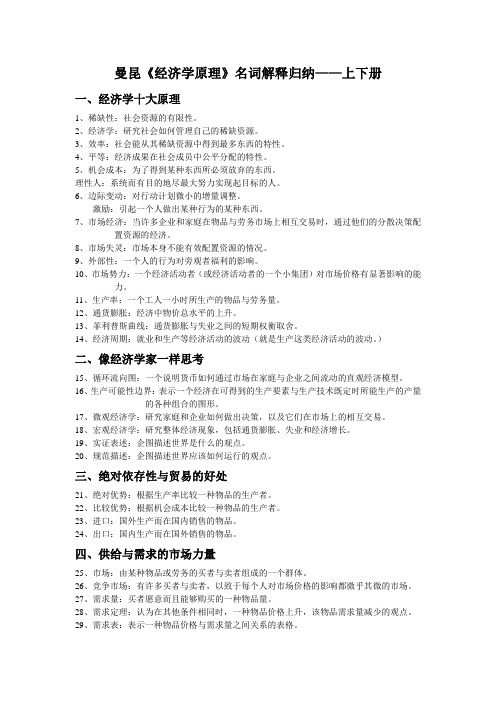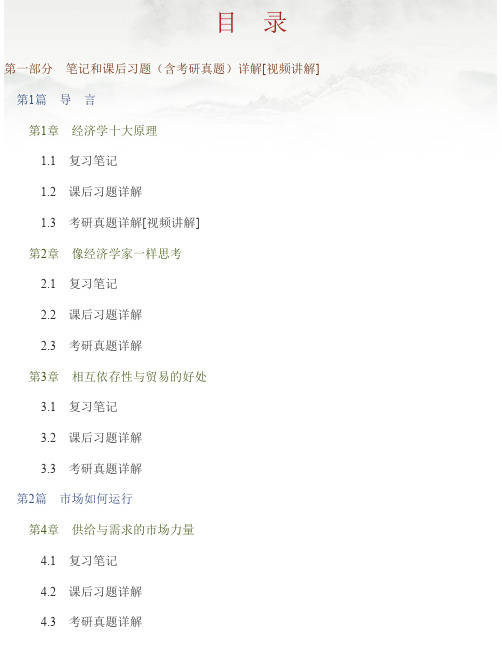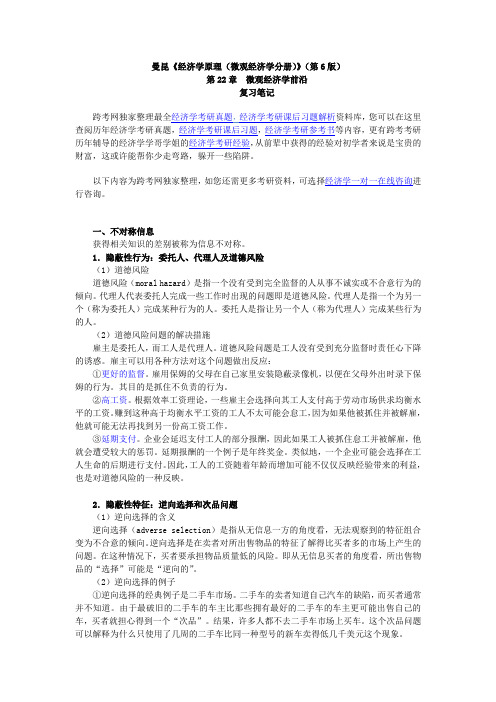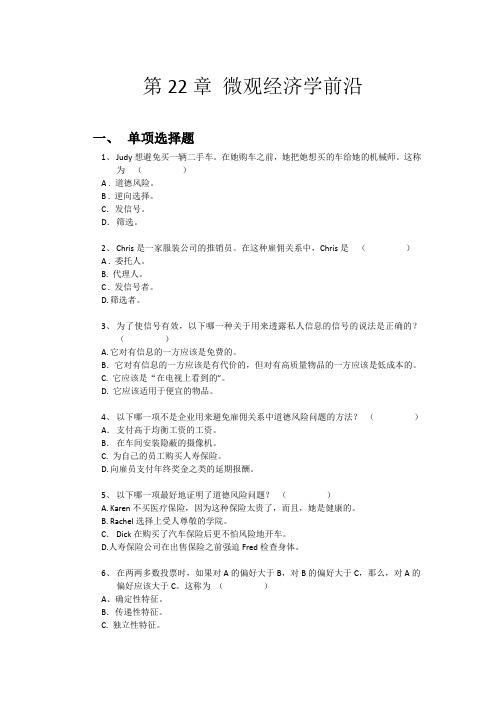经济学原理 (17.2)--微观经济学前沿
曼昆-经济学原理-概念归纳

曼昆《经济学原理》名词解释归纳——上下册一、经济学十大原理1、稀缺性:社会资源的有限性。
2、经济学:研究社会如何管理自己的稀缺资源。
3、效率:社会能从其稀缺资源中得到最多东西的特性。
4、平等:经济成果在社会成员中公平分配的特性。
5、机会成本:为了得到某种东西所必须放弃的东西。
理性人:系统而有目的地尽最大努力实现起目标的人。
6、边际变动:对行动计划微小的增量调整。
激励:引起一个人做出某种行为的某种东西。
7、市场经济:当许多企业和家庭在物品与劳务市场上相互交易时,通过他们的分散决策配置资源的经济。
8、市场失灵:市场本身不能有效配置资源的情况。
9、外部性:一个人的行为对旁观者福利的影响。
10、市场势力:一个经济活动者(或经济活动者的一个小集团)对市场价格有显著影响的能力。
11、生产率:一个工人一小时所生产的物品与劳务量。
12、通货膨胀:经济中物价总水平的上升。
13、菲利普斯曲线:通货膨胀与失业之间的短期权衡取舍。
14、经济周期:就业和生产等经济活动的波动(就是生产这类经济活动的波动。
)二、像经济学家一样思考15、循环流向图:一个说明货币如何通过市场在家庭与企业之间流动的直观经济模型。
16、生产可能性边界:表示一个经济在可得到的生产要素与生产技术既定时所能生产的产量的各种组合的图形。
17、微观经济学:研究家庭和企业如何做出决策,以及它们在市场上的相互交易。
18、宏观经济学:研究整体经济现象,包括通货膨胀、失业和经济增长。
19、实证表述:企图描述世界是什么的观点。
20、规范描述:企图描述世界应该如何运行的观点。
三、绝对依存性与贸易的好处21、绝对优势:根据生产率比较一种物品的生产者。
22、比较优势:根据机会成本比较一种物品的生产者。
23、进口:国外生产而在国内销售的物品。
24、出口:国内生产而在国外销售的物品。
四、供给与需求的市场力量25、市场:由某种物品或劳务的买者与卖者组成的一个群体。
26、竞争市场:有许多买者与卖者,以致于每个人对市场价格的影响都微乎其微的市场。
曼昆《经济学原理(微观经济学分册)》(第6版)笔记和课后习题(含考研真题)详解【讲解】

目 录第一部分 笔记和课后习题(含考研真题)详解[视频讲解]第1篇 导 言第1章 经济学十大原理1.1 复习笔记1.2 课后习题详解1.3 考研真题详解[视频讲解]第2章 像经济学家一样思考2.1 复习笔记2.2 课后习题详解2.3 考研真题详解第3章 相互依存性与贸易的好处3.1 复习笔记3.2 课后习题详解3.3 考研真题详解第2篇 市场如何运行第4章 供给与需求的市场力量4.1 复习笔记4.2 课后习题详解4.3 考研真题详解第5章 弹性及其应用5.1 复习笔记5.2 课后习题详解5.3 考研真题详解[视频讲解]第6章 供给、需求与政府政策6.1 复习笔记6.2 课后习题详解6.3 考研真题详解[视频讲解]第3篇 市场和福利第7章 消费者、生产者与市场效率7.1 复习笔记7.2 课后习题详解7.3 考研真题详解第8章 应用:赋税的代价8.1 复习笔记8.2 课后习题详解8.3 考研真题详解第9章 应用:国际贸易9.1 复习笔记9.2 课后习题详解9.3 考研真题详解第4篇 公共部门经济学第10章 外部性10.1 复习笔记10.2 课后习题详解10.3 考研真题详解[视频讲解]第11章 公共物品和公共资源11.1 复习笔记11.2 课后习题详解11.3 考研真题详解[视频讲解]第12章 税制的设计12.1 复习笔记12.2 课后习题详解12.3 考研真题详解第5篇 企业行为与产业组织第13章 生产成本13.1 复习笔记13.2 课后习题详解13.3 考研真题详解[视频讲解]第14章 竞争市场上的企业14.1 复习笔记14.2 课后习题详解14.3 考研真题详解[视频讲解]第15章 垄 断15.1 复习笔记15.2 课后习题详解15.3 考研真题详解[视频讲解]第16章 垄断竞争16.1 复习笔记16.2 课后习题详解16.3 考研真题详解[视频讲解]第17章 寡 头17.1 复习笔记17.2 课后习题详解17.3 考研真题详解[视频讲解]第6篇 劳动市场经济学第18章 生产要素市场18.1 复习笔记18.2 课后习题详解18.3 考研真题详解[视频讲解]第19章 收入与歧视19.1 复习笔记19.2 课后习题详解19.3 考研真题详解第20章 收入不平等与贫困20.1 复习笔记20.2 课后习题详解20.3 考研真题详解[视频讲解]第7篇 深入研究的论题第21章 消费者选择理论21.1 复习笔记21.2 课后习题详解21.3 考研真题详解[视频讲解]第22章 微观经济学前沿22.1 复习笔记22.2 课后习题详解22.3 考研真题详解[视频讲解]第二部分 模拟试题及详解曼昆《经济学原理(微观经济学分册)》(第6版)模拟试题及详解(一)曼昆《经济学原理(微观经济学分册)》(第6版)模拟试题及详解(二)第一部分 笔记和课后习题(含考研真题)详解[视频讲解]第1篇 导 言第1章 经济学十大原理1.1 复习笔记1.经济学经济学是研究如何将稀缺的资源有效地配置给相互竞争的用途,以使人类的欲望得到最大限度满足的科学。
经济学原理 (17.1)--微观经济学前沿:实验与行为经济学

PD Game Left (A)
Top (A)
Bottom (B)
7, 7 10, 2
Right (B) 2, 10 4, 4
SI Game Left (A)
Top
7, 7
(A)
Bottom 9, 2 (B)
Right (B) 2, 9 10, 10
When PD is paired with SI, the proportion of SS is weakly significantly higher than PD is played alone (46 vs. 18%, p=0.070, 1-sided permutation tests).
② 多等 1 个月, 7 个月后给您 300 元【选择②,结束问卷】
看到您还是选择 6 个月后拿 200 块,而不是 7 个月后拿 300 块,老板说,“那你要 24 多少钱才愿意 7 个月后领加班费呢?” 请填写任意一个大于 300 的数。 【在右侧答
案框中填写,结束问卷】
Present bias: People are more impatient now than in the future.
What do they tell us? Social Preference
• Pdeeocipsiloencso.nsider fairness, reciprocity, and other-regarding preferences in their • Example: Chen, Li, Liu and Shih, Forthcoming, Games and Economic Behavior, 2014. • SfoSiafalopedrrutrarroaaseaeggmyegmdntaaosmeritmnniinfsigedftiieg,zzansiimenfwaaritfosfytttoeaeiifii:cnaoorxlmaAmeneginnmnnssdsia((ntst.etisnlizihyIbecntmniihehnpfavlfenuoagueciwscmiknsolcssaitogelt)ie-t)lrrrgneeiixoakikdafdtpftuetfetoeecohelnenyonrgrerdtctityottimeshsitoartiayedntynebl,coiindeesnheawiwftcnaogpfpeocetconorrimoecfioisirsifstnkenonieosocddn.tsfhnaouoIeipinetfngcngrhartith’ecdc’laserysrtotetedehdi,dimncfnaiecafilitlsecopropiteitrmranmaemyaetnrfgamopfilimtlasnesysnaoaerc’artgdntscmehgeigio,vdtveaauohpepemmtmlrerlurtoydisiembeicdeinitsn.hlsih,ii.imacnomameBtgiueciyumcoonnaeomptnaisinvcorvij-aooeiotfeamrnnrmrfatosfdiaicnoilnmrt,lhacgrygnpatootiaiaailongnnoltreapdnuttnmieiahrcvgralieieaepdljsotUauf,iinaonanctnlitsstineingd
曼昆《经济学原理(微观经济学分册)》(第6版)笔记(第22章 微观经济学前沿)

曼昆《经济学原理(微观经济学分册)》(第6版)第22章微观经济学前沿复习笔记跨考网独家整理最全经济学考研真题,经济学考研课后习题解析资料库,您可以在这里查阅历年经济学考研真题,经济学考研课后习题,经济学考研参考书等内容,更有跨考考研历年辅导的经济学学哥学姐的经济学考研经验,从前辈中获得的经验对初学者来说是宝贵的财富,这或许能帮你少走弯路,躲开一些陷阱。
以下内容为跨考网独家整理,如您还需更多考研资料,可选择经济学一对一在线咨询进行咨询。
一、不对称信息获得相关知识的差别被称为信息不对称。
1.隐蔽性行为:委托人、代理人及道德风险(1)道德风险道德风险(moral hazard)是指一个没有受到完全监督的人从事不诚实或不合意行为的倾向。
代理人代表委托人完成一些工作时出现的问题即是道德风险。
代理人是指一个为另一个(称为委托人)完成某种行为的人。
委托人是指让另一个人(称为代理人)完成某些行为的人。
(2)道德风险问题的解决措施雇主是委托人,而工人是代理人。
道德风险问题是工人没有受到充分监督时责任心下降的诱惑。
雇主可以用各种方法对这个问题做出反应:①更好的监督。
雇用保姆的父母在自己家里安装隐蔽录像机,以便在父母外出时录下保姆的行为。
其目的是抓住不负责的行为。
②高工资。
根据效率工资理论,一些雇主会选择向其工人支付高于劳动市场供求均衡水平的工资。
赚到这种高于均衡水平工资的工人不太可能会怠工,因为如果他被抓住并被解雇,他就可能无法再找到另一份高工资工作。
③延期支付。
企业会延迟支付工人的部分报酬,因此如果工人被抓住怠工并被解雇,他就会遭受较大的惩罚。
延期报酬的一个例子是年终奖金。
类似地,一个企业可能会选择在工人生命的后期进行支付。
因此,工人的工资随着年龄而增加可能不仅仅反映经验带来的利益,也是对道德风险的一种反映。
2.隐蔽性特征:逆向选择和次品问题(1)逆向选择的含义逆向选择(adverse selection)是指从无信息一方的角度看,无法观察到的特征组合变为不合意的倾向。
经济学原理(微观部分)

经济学原理(微观部分)经济学原理是经济学的基础,它是经济学研究的起点。
本篇文章主要介绍经济学原理中的微观经济学部分,主要包括生产者理论、消费者理论和市场均衡。
一、生产者理论生产者理论主要关注生产者如何制定生产计划以达到最大利润。
在生产者理论中,最重要的概念之一是边际成本和边际收益。
边际成本是指生产一个单位所需要的成本,边际收益是指生产一个单位所获得的额外收益。
在制定生产计划时,生产者需要将边际成本与边际收益进行比较,以确定最佳生产水平。
当边际成本等于边际收益时,即达到最大利润的水平。
此时,生产者应该停止增加生产,因为增加生产将导致边际成本大于边际收益,从而导致利润下降。
生产者理论还可以用来解释竞争性市场中的股价的变化。
当制造商收到投资者的信号警告时,由于利润增加,他们将增加生产,导致股价下降。
相反,当投资者感到乐观时,由于利润下降,生产者将减少生产,导致股价上涨。
生产者理论的另一个应用是在制定环保政策时。
在没有任何政府干预的情况下,高污染企业很少会采取降低污染的措施,因为这将增加他们的成本。
政府可以通过征收污染排放费,让高污染企业面临更高的成本,从而激励他们采取措施减少污染。
二、消费者理论消费者理论主要关注消费者如何根据其预算约束选择最佳消费组合。
在约束的情况下,消费者会根据其偏好函数选择最满意的消费组合。
最基本的消费者理论概念是边际效用和收入效应。
边际效用是指消费最后一个单位所提供的额外效用,收入效应是指消费通过改变收入而引起的消费量变化。
当消费者面临收入变化时,他们会根据其边际效用和收入效应调整其消费组合。
在一般情况下,当收入上涨时,消费者会倾向于增加正常商品的消费,并减少相对于其他商品的数量。
相反,当收入下降时,消费者倾向于减少正常商品的消费,增加相对于其他商品的数量。
消费者理论可以用来解释不同市场之间的市场交换价值问题。
市场交换价值是指市场双方获得的总效用。
在供需曲线交叉的地方,市场交换价值达到最大值。
曼昆《经济学原理(微观经济学分册)》(第6版)课后习题详解

第14章竞争市场上 的企业
第13章生产成本
第15章垄断
第16章垄断 竞争
第17章寡头
第19章收入与歧视
第18章生产要素市 场
第20章收入不平等 与贫困
第21章消费 者选择理论
第22章微观 经济学前沿
作者介绍
读书笔记
这是《曼昆《经济学原理(微观经济学分册)》(第6版)课后习题详解》的读书笔记模板,可以替换为自己 的心得。
目录分析
第2章像经济学家 一样思考
第1章经济学十大 原理
第3章相互依存性 与贸易的好处
第5章弹性及其应 用
第4章供给与需求 的市场力量
第6章供给、需求 与政府政策
第8章应用:赋税 的代价
第7章消费者、生 产者与市场效率
第9章应用:国际 贸易
第11章公共物品和 公共资源
第10章外部性
第12章税制的设计
曼昆《经济学原理(微观经济学分 册)》(第6版)课后习题详解
读书笔记模板
01 思维导图
03 目录分析 05 读书笔记
目录
02 内容摘要 04 作者介绍 06 精彩摘录
思维导图
关键字分析思维导图
习题
教材
消费者
微观经济 学
企业
习题
供给
微观经 济学
经济学
原理
第章
需求
曼昆经济 学பைடு நூலகம்
市场
经济学家
第篇
收入
应用
税制
内容摘要
本书特别适用于参加研究生入学考试指定考研参考书目为曼昆《经济学原理(微观经济学分册)》的考生, 也可供各大院校学习曼昆《经济学原理(微观经济学分册)》的师生参考。曼昆的《经济学原理》是世界上最流 行的初级经济学教材,也被众多院校列为经济类专业考研重要参考书目。为了帮助学生更好地学习这本教材,我 们有针对性地编著了它的配套辅导用书(均提供免费下载,免费升级):1.曼昆《经济学原理(微观经济学分 册)》(第6版)笔记和课后习题详解(含考研真题)[视频讲解]2.曼昆《经济学原理(微观经济学分册)》 【教材精讲+考研真题解析】讲义与视频课程【35小时高清视频】3.曼昆《经济学原理(微观经济学分册)》 (第6版)课后习题详解4.曼昆《经济学原理(微观经济学分册)》(第5版)课后习题详解5.曼昆《经济学原 理(微观经济学分册)》配套题库【名校考研真题(视频讲解)+课后习题+章节练习+模拟试题】6.曼昆《经济 学原理(宏观经济学分册)》(第6版)笔记和课后习题详解(含考研真题)[视频讲解]7.曼昆《经济学原理 (宏观经济学分册)》【教材精讲+考研真题解析】讲义与视频课程【27小时高清视频】8.曼昆《经济学原理 (宏观经济学分册)》(第6版)课后习题详解9.曼昆《经济学原理(宏观经济学分册)》(第5版)课后习题 详解10.曼昆《经济学原理(宏观经济学分册)》配套题库【名校考研真题(视频讲解)+课后习题+章节练习+ 模拟试题】本书是曼昆《经济学原理(微观经济学分册)》(第6版)教材的配套e书,参考国外教材的英文答案 和相关资料对曼昆《经济学原理(微观经济学分册)》(第6版)教材每章的课后习题进行了详细的分析和解答, 并对个别知识点进行了扩展。课后习题答案久经修改,非常标准,特别适合应试作答和临考冲刺。另外,部分高 校,如武汉大学、深圳大学等,研究生入学考试部分真题就来自于该书课后习题,因此建议考生多加重视。
第22章微观经济学前沿

孔多塞悖论
选民类型
1类
2类
选民的比例 35
45
第一选择 A
B
第二选择 B
C
第三选择 C
A
Lou,Fang. School of Economics,SHUFE
3类 20 C A B
如果选民对结果A、B、和C都有偏好,那么在一 对对的大多数投票中,A击败B,B击败C,而C 击败A。
孔多塞悖论的一个含义是:要投票的顺序会影响 结果。如果先建议在A、B中选择,然后赢家与C 比较,C会获胜。如果先建一在B、C中选择,然 后赢家与A比较,则A会获胜。
博达计算是,把对于每个选民来说,我们可以给 排在最后的选择打1分,排在倒数第二的选择打2 分,给排在倒数第三的打3分。总分最高的获胜 。
Lou,Fang. School of Economics,SHUFE
很多运动队排序的投票中经常使用这种方法。 但尽管博达计算解决了孔多塞的传递性问题,但
一种完美的投票制度应该满足以下四个特征: 1/ 确定性,如果每个人对A的偏好都大于B,则A击
败了B。 2/ 传递性,如果A击败了B,B击败了C,则A一定击
败C。 3/ 其他不相关选择的独立性:任何两个结果之间的
排序不应取决于是否还可以得到某个第三种结果。 4/ 没有独裁者,无论其他每个人的偏好怎样,没有
中值选民定理的另一个含义是,少数人的观点不 会被过多重视。多数规则并不是考虑到每个人偏 好的一种综合,而是只注意正好分布在中间的人 。
Lou,Fang. School of Economics,SHUFE
(4)政治家是自利的
研究消费者行为,假设购买行为个人效用最大化
研究企业行为,假设利润最大化
第22章微观经济学前沿培训课件

第22章微观经济学前沿一、单项选择题1、Judy想避免买一辆二手车。
在她购车之前,她把她想买的车给她的机械师。
这称为()A . 道德风险。
B . 逆向选择。
C.发信号。
D.筛选。
2、Chris是一家服装公司的推销员。
在这种雇佣关系中,Chris是()A . 委托人。
B. 代理人。
C . 发信号者。
D.筛选者。
3、为了使信号有效,以下哪一种关于用来透露私人信息的信号的说法是正确的?()A.它对有信息的一方应该是免费的。
B.它对有信息的一方应该是有代价的,但对有高质量物品的一方应该是低成本的。
C. 它应该是“在电视上看到的”。
D. 它应该适用于便宜的物品。
4、以下哪一项不是企业用来避免雇佣关系中道德风险问题的方法?()A.支付高于均衡工资的工资。
B.在车间安装隐蔽的摄像机。
C. 为自己的员工购买人寿保险。
D.向雇员支付年终奖金之类的延期报酬。
5、以下哪一项最好地证明了道德风险问题?()A.Karen不买医疗保险,因为这种保险太贵了,而且,她是健康的。
B.Rachel选择上受人尊敬的学院。
C.Dick在购买了汽车保险后更不怕风险地开车。
D.人寿保险公司在出售保险之前强迫Fred检查身体。
6、在两两多数投票时,如果对A的偏好大于B,对B的偏好大于C,那么,对A的偏好应该大于C。
这称为()A、确定性特征。
B.传递性特征。
C. 独立性特征。
D. 不可能性特征。
二、判断题1、信息不对称是指在交易中一个人对交易如何进行知道得比另一个人多。
()2、在委托-代理关系中,委托人代表代理人完成某项工作。
()3、雇主会为了避免雇佣关系中怠工成本引起的道德风险而支付高于均衡工资的工资。
()4、为了避免逆向选择问题,保险公司对其未来客户进行筛选,以发现隐蔽的健康问题。
()5、当信号对行业中所有企业都无成本时,发出传递高质量的信号最有效。
()6、康多塞悖论表明,多数原则总能告诉我们社会实际上想要的结果。
()7、阿罗不可能性定理证明,没有一种投票制度能满足完美投票制度所要求的性质。
- 1、下载文档前请自行甄别文档内容的完整性,平台不提供额外的编辑、内容补充、找答案等附加服务。
- 2、"仅部分预览"的文档,不可在线预览部分如存在完整性等问题,可反馈申请退款(可完整预览的文档不适用该条件!)。
- 3、如文档侵犯您的权益,请联系客服反馈,我们会尽快为您处理(人工客服工作时间:9:00-18:30)。
Smokers could face steep penalty under new health care lawPOSTED: 01/25/2013 12:01:00 AM MSTUPDATED: 01/25/2013 02:41:55 AM MST By Ricardo Alonso-ZaldivarThe Associated PressWASHINGTON —Millions of smokers could be priced out of health insurance because of tobacco penalties in President Barack Obama's health care law, according to experts who are just now teasing out the potential impact of a little-noted provision in the massive legislation.The Affordable Care Act —"Obamacare" to some —allows health insurers to charge smokers buying individual policies up to 50 percent higher premiums starting next Jan. 1.For a 55-year-old smoker, the penalty could reach nearly $4,250 a year. A 60-year-old could wind up paying nearly $5,100 on top of premiums.Younger smokers could be charged lower penalties under rules proposed last fall by the Obama administration. But older smokers could face a heavy hit on their household budgets at a time in life when smoking-related illnesses tend to emerge.Workers covered on the job would be able to avoid tobacco penalties by joining smoking cessation programs because employer plans operate under different rules. But experts say that option is not guaranteed to smokers trying to purchase coverage individually.35 million smokersNearly one of every five U.S. adults smokes. That share is higher among lower-income people who also are more likely to work in jobs that don't come with health insurance and would therefore depend on the new federal health care law. Smoking increases the risk of developing heart disease, lung problems and cancer, contributing to nearly 450,000 deaths a year.Insurers won't be allowed to charge more under the overhaul for people who are overweight, or have a health condition like a bad back or a heart that skips beats — but they can charge more if a person smokes.Starting next Jan. 1, the federal health care law will make it possible for people who can't get coverage now to buy private policies, providing tax credits to keep the premiums affordable.Although the law prohibits insurance companies from turning away the sick, the penalties for smokers could have the same effect in many cases, keeping out potentially costly patients."We don't want to create barriers for people to get health care coverage," said California state Assemblyman Richard Pan, who is working on a law in his state that would limit insurers' ability to charge smokers more.The federal law allows states to limit or change the smoking penalty."We want people who are smoking to get smoking cessation treatment," said Pan, a pediatrician who represents the Sacramento area.Colorado law allows insurance companies to charge more for smokers in small-group policies. Many larger, self-insured companies are beginning to either reward smokers for quitting or charging penalties to continuing smokers.Anthem last year began charging Colorado companies buying small-group policies more for their smokers, up to 15 percent, and suggests that the companies pass the cost on to the smoker to have the intended effect of getting them to quit.Bleak optionsObama administration officials declined to be interviewed for this article, but a former consumer protection regulator for the government is raising questions."If you are an insurer and there is a group of smokers you don't want in your pool, the ones you really don't want are the ones who have been smoking for 20 or 30 years," said Karen Pollitz, an expert on individual health insurance markets with the nonpartisan Kaiser Family Foundation. "You would have the flexibility to discourage them."Several provisions in the federal health care law work together to leave older smokers with a bleak set of financial options, said Pollitz, formerly deputy director of the Office of Consumer Support in the federal Health and Human Services Department.First, the law allows insurers to charge older adults up to three times as much as their youngest customers.Second, the law allows insurers to levy the full 50 percent penalty on older smokers while charging less to younger ones.And finally, government tax credits that will be available to help pay premiums cannot be used to offset the cost of penalties for smokers."The effect of the smoking (penalty) allowed under the law would be that lower-income smokers could not afford health insurance," said Richard Curtis, president of the Institute for Health Policy Solutions, a nonpartisan research group that called attention to the issue with a study about the potential impact in California.Playing defenseIn today's world, insurers can simply turn down a smoker. Under Obama's overhaul, would they actually charge the full 50 percent? After all, workplace anti-smoking programs that use penalties usually charge far less, maybe $75 or $100 a month.Robert Laszewski, a consultant who previously worked in the insurance industry, says there's a good reason to charge the maximum."If you don't charge the 50 percent, your competitor is going to do it, and you are going to get a disproportionate share of the less-healthy older smokers," Laszewski said. "They are going to have to play defense."Affordable care? Not if you smokeTake a hypothetical 60-year-old smoker making $35,000 a year. Estimated premiums for coverage in the new private health insurance markets under the President Barack Obama law would total $10,172. That person would be eligible for a tax credit that brings down the cost to $3,325. But the smoking penalty could add $5,086 to the cost. And because federal tax credits can't be used to offset the penalty, the smoker's total cost for health insurance would be $8,411, or 24 percent of income. That's considered unaffordable under the federal law. The numbers were estimated using the online Kaiser Health Reform Subsidy Calculator.The Associated Press请阅读以上新闻,围绕下面的问题,写一个A4 纸一页以内的memo,并于本周六(3 月23日)晚上24 点前发到相应的小课助教邮箱,邮件主题统一命名为“经原小课第 5 周memo”。
